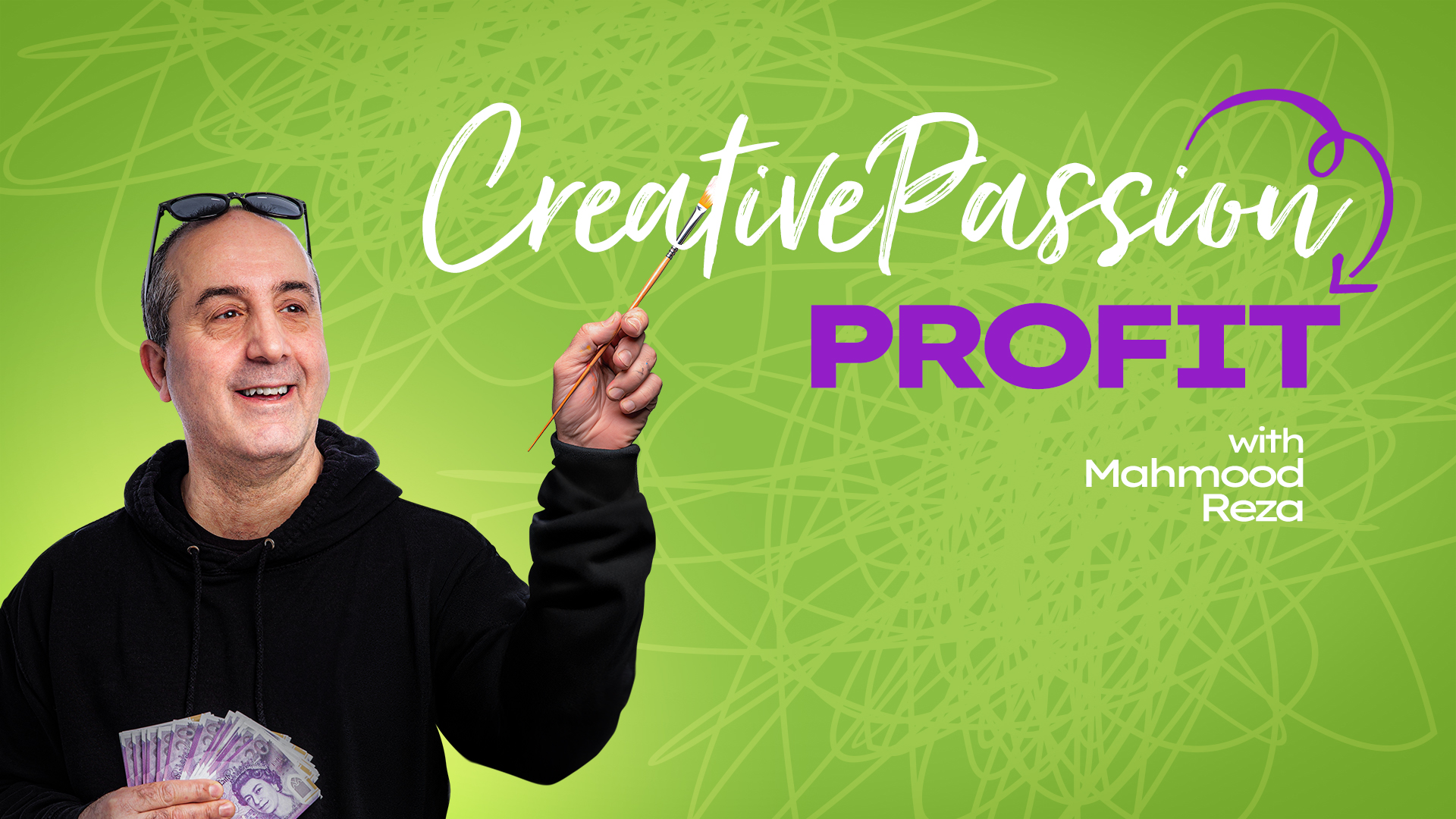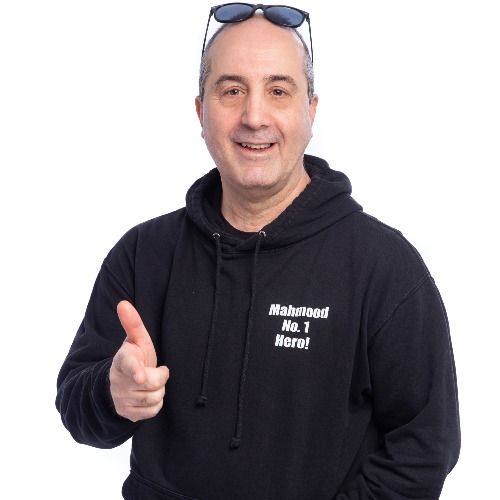Why your creativity deserves a business mindset
"If you don't drive your business, you will be driven out of business." - B.C. Forbes
If you’re like most creative professionals, you often think your artistic work isn't compatible with business. But ignoring the business side can hamper your potential and drain your passion.
My aim in "From Creative Passion to Profit" is to bridge the gap between creativity and business, helping artists thrive in both realms.
With 25+ years of transforming numbers into business success, I'll share key mindset shifts to elevate your creative career economically and sustainably.
The Transition from Creative to Professional
In this episode, we dive into three key mindset shifts essential for turning your creative passion into a profitable venture.
First, we tackle the tricky subject of putting value on your work....
Timestamped summary
00:00 "Creativity is a Business"
06:14 Pause Before Saying Yes
06:53 Artist vs. Business Mindset
Mentioned in this episode:
Training
Training
Transcript
Welcome to From Creative Passion to Profit. It's the
Speaker:podcast where creativity walks arm in arm with
Speaker:business. My aim is to help you build a thriving
Speaker:creative career. And today I'm going to be tackling a topic that is
Speaker:very common amongst creatives and artists, and
Speaker:that's not thinking like a business.
Speaker:Now, I'm not saying you sacrifice your artistic soul, I'm not saying
Speaker:you sacrifice your artistic DNA, but you need to embrace
Speaker:the world of business and adapt it to your creative
Speaker:practice if you want to build a prosperous creative
Speaker:career. I know what you're thinking. We're not in the business of
Speaker:making money. It's our artistic impact we're concerned with. And
Speaker:surely that business stuff, that's for the suits, that's for corporates,
Speaker:that's for spreadsheets and the like, not for us. But
Speaker:hear me out. The moment you actually reform, re,
Speaker:energize and reframe your thinking and see your creative work as
Speaker:a professional service and not just a mere humble passion
Speaker:project is the moment your creative practice accelerates and
Speaker:takes off. Now, let's throw in an example. There's Serena,
Speaker:an amazing artist. Every evening, every weekend, she's
Speaker:sketching away. She publishes her work online, but she feels in a
Speaker:bit of a rut, a bit of a quagmire. She does sell the occasional
Speaker:piece, but she feels guilty for asking for more money,
Speaker:in her mind is artwork. Nobody appreciates the work. It's
Speaker:just a hobby, she says, and she has no way of moving forward
Speaker:with this. Does that sound familiar to you? This is not a talent issue, but
Speaker:this is a business and a reframing issue. And without planning,
Speaker:without thinking forward, you're going to be in a constant cycle of
Speaker:undercharging and overworking. And the truth is, if you're
Speaker:really serious about your craft, if you really are serious about
Speaker:showcasing your talent to the wider world and doing it as a full time
Speaker:activity or perhaps a profitable part time activity, then you
Speaker:need to start thinking as a business. And whatever anybody says to
Speaker:you, don't accept their stobbery. Being a creative, being an artist is
Speaker:a business. Now, in this episode, I'm going to be covering three
Speaker:key mindset shifts to help you get there. Number
Speaker:one, putting value on your work. Number two,
Speaker:appreciating that profit is not a bad thing. Profit
Speaker:is the thing that powers your creative practice, sustains your creative
Speaker:practice and makes sure that you're here next year. Provides a
Speaker:decent income for yourself, and. It helps you deliver your why to your
Speaker:audience appreciation. The costs of your Creativity. And yes,
Speaker:there are costs concerned. And as a bougie bonus, setting
Speaker:boundaries that protect you and your creative practice.
Speaker:Start with the idea of putting value on your work. Now, creative
Speaker:people often struggle to put. A price on their talent. The
Speaker:appreciation, the love of doing the work, the inability to
Speaker:embrace the idea of charging gets in the way.
Speaker:That thought might be floating through your mind is, can I really charge
Speaker:people for what I'm doing? My short answer is
Speaker:absolutely, you can and absolutely you should. Your work has
Speaker:value because it's unique. It's. It's unique to the person who's looking at
Speaker:it. It's unique to the person who's viewing it. It's unique to the person who's
Speaker:experiencing it. Think about it. You pay a plumber to fix your sink.
Speaker:Wouldn't you? If you wouldn't, they're not going to fix your sink for you. They've
Speaker:got skills and experiences just like you. So here's your first
Speaker:mindset shift. Stop seeing payment as a favor. Somebody
Speaker:is helping you out. It's a reflection of the value you bring.
Speaker:It's an exchange. You're bringing joy, you're bringing impact.
Speaker:And monetary exchange seems a bargain. The next thing is
Speaker:the idea of. Profitability and making profits. Now, many
Speaker:artists that I know and work with, from comedians,
Speaker:musicians, actors, performers. Will tell me
Speaker:initially that they're not in it for the money, they're not in it for making
Speaker:profits. And that's a fair observation, a fair comment for them to
Speaker:make. However, every type of business,
Speaker:whatever space. You inhabit, if you do not look to making a profit
Speaker:to recoup your costs and make something on top of. It, you never build
Speaker:up a fighting fund, you never build up reserves, you never reward
Speaker:yourself fairly. You'll be unable to invest in the
Speaker:future, you'll be unable to operate, and. You'Ll just
Speaker:introduce stress and anxiety into your life when it shouldn't be there.
Speaker:There's nothing wrong with making profit how you make it,
Speaker:what you do with. That profit is a secondary conversation. But
Speaker:absolutely, profit is a necessity. Let's also talk
Speaker:about costs. Now, you might be charging, for arguments sake, £200. So
Speaker:think about Serena in our earlier example. But what about the time and
Speaker:the materials and all the overheads, the expenses
Speaker:required to make that piece of work? Now, if she's spending
Speaker:£100 on supplies. And another 20 hours drawing, the
Speaker:£200. She'S charging starts to look pretty miserable
Speaker:and pretty thin. To run your sustainable creative business,
Speaker:you need to factor in all of the costs. Now, the obvious ones
Speaker:like materials and studio space, but also things like travel,
Speaker:time, traveling to see a client, traveling to do the piece of work,
Speaker:marketing, promotion. All of those have a cost attached to
Speaker:it. Now it was a straightforward, easy way to start. Make a
Speaker:note of the costs involved in your creative process. Now, whether you do
Speaker:it online, digitally, or whether you do it on a piece of paper matters
Speaker:not. But write down the costs involved in your creative process.
Speaker:You'll be surprised of how much slips under the radar. Now
Speaker:let's talk boundaries. As a creative, it's tempting to say yes to
Speaker:every opportunity. Been there, seen it, worn the T shirt,
Speaker:free gigs, exposure, deals. Yep, do this for nothing and
Speaker:you'll get wide known underpricing your commissions just to get a piece of
Speaker:work. Understandable. But it adds up to burnout. And it adds
Speaker:up to reinforcing the low value you might put in yourself.
Speaker:Now try this. For the next few weeks, practice saying
Speaker:no to offers that don't match your worth. Or pause before
Speaker:you say yes. For example, if somebody asks for a discount, reframe
Speaker:that. Perhaps try something like I'd love to help, but my rate
Speaker:reflects the time and materials needed to deliver quality. One that I
Speaker:share with my clients is to say, I'd love to, but my accountant
Speaker:would have a go at me. It's not fair on my current clients there. But
Speaker:don't immediately say yes to an offer. Value
Speaker:your work and value yourself. Understand and appreciate your costs
Speaker:and set those boundaries. Not only will you earn more, but. You
Speaker:will also protect your passion from burnout. Now let me know
Speaker:what you think folks. Does it resonate with what your thoughts are? Do you think
Speaker:like a business owner? Or do you think just like an artist and ignore
Speaker:the business disciplines required until next time.




